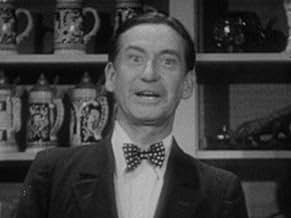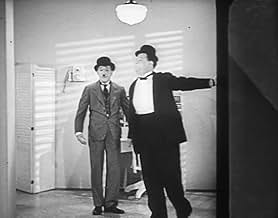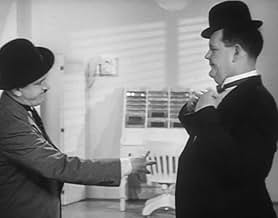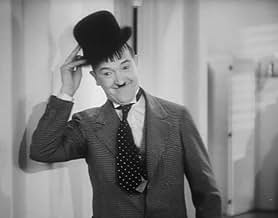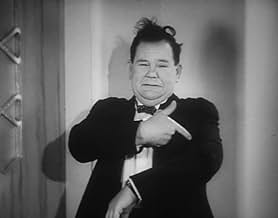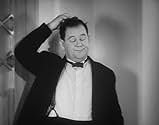After an endless cycle of dish washing, Ollie makes a withdrawal, ending up in the hospital after buying a grandfather clock. Only a generous blood transfusion can help him bounce back; howe... Read allAfter an endless cycle of dish washing, Ollie makes a withdrawal, ending up in the hospital after buying a grandfather clock. Only a generous blood transfusion can help him bounce back; however, is modern medicine prepared for the outcome?After an endless cycle of dish washing, Ollie makes a withdrawal, ending up in the hospital after buying a grandfather clock. Only a generous blood transfusion can help him bounce back; however, is modern medicine prepared for the outcome?
- Auctioneer
- (uncredited)
- Bank Teller
- (uncredited)
- Dr. F.D. Allen
- (uncredited)
- Hospital Visitor
- (uncredited)
- Man at Auction
- (uncredited)
- Nurse
- (uncredited)
- Auction Bidder
- (uncredited)
- Nurse Goodall
- (uncredited)
- Bank Teller
- (uncredited)
Featured reviews
Although more than fine in its own right, 'Thicker Than Water' is most notable for being their last short film, meaning them in the lead roles and not just a cameo appearance. Didn't find 'Thicker Than Water' one of the duo's best, in a filmography that was mostly solid to classic (only '45 Minutes from Hollywood' misfired for me but that was very early on when their partnership and style hadn't formed or evolved and when Hardy especially was not being used well), nonetheless it is still very good and has much of what makes Laurel and Hardy's work as appealing as it is.
Flaws are very little and more nit-picks really. The story is slight and a bit disjointed.
Do also agree to an extent that while the ending is very funny, it also felt a little tacked on.
More often than not though, 'Thicker Than Water' is great fun, not always hilarious but has enough amusing parts. It is never too silly, it doesn't lose its energy and the sly wit is here, some of the material may not be new but how it's executed actually doesn't feel too familiar and it doesn't get repetitive. The physical comedy comes thick and fast and choreographed and performed beautifully, and the witty verbal interplay shines every bit as much. The beginning is one of the duo's funniest.
Laurel and Hardy are on top form here, both are well used, both have material worthy of them and they're equal rather than one being funnier than the other (before Laurel tended to be funnier and more interesting than Hardy, who tended to be underused). Their chemistry sparkles and after taking time their early efforts to fully form it certainly felt well established from 'Two Tars' onwards and since then has not let up. Their comic timing is impeccable, both in the physical comedy than the verbal.
'Thicker Than Water' looks good visually, the energy is there from start to finish and the direction shows a sense of being at ease with the material and doesn't let it get too busy or static. Daphne Pollard and James Finlayson are great support.
Overall, very good. Not essential or classic Laurel and Hardy, but a good representation of them. 8/10 Bethany Cox
Personally I felt that the banter about who gave the money to whom went on a bit longer than it needed to. I hope audiences in 1935 found it more engaging than I did.
The main reason I wanted to write a review is that I was impressed by the creative and clever way they handled scene changes from the Hardy house to other locations. Stanley grabs what might be some sort of pocket door or panel (if it were a real house) and pulls on its thick black border to walk it across the screen. The scene changes with it. In one of these clever "wipes" he accidentally lets go and it returns to the right side of the screen. So he grabs it again and walks it across the room. The scene change follows the movement of this panel. I haven't seen this trick done before. And being that this was decades before green screen, it must have been rather labor intensive to handle it in the cutting room. Bravo for this quirky little technique!
The boys begin by pulling a "who gave who the money to pay so and so" that's about as classic as the Abbott and Costello "Who's on first?" routine. DAPHNE POLLARD is Oliver Hardy's harassed wife who is so diminutive that she has to climb a chair in order to hit him over the head with a frying pan after one of his crazy schemes (at an auction) ends up with him having to turn over all their money for a grandfather clock which gets crushed by a truck.
Enjoyable romp for Laurel and Hardy fans. The twist ending serves as the icing on the cake.
Thicker Than Water concerns Stan and Ollie, who are just about to head to the local baseball game when Ollie's wife (Daphne Pollard) scolds Ollie for ditching her with all the dishes and forces both men to wash them before leaving. After a hilarious scene, exercising Horne's directorial formula of filming various things accelerate into complete chaos, a man shows up to collect payment for some furniture Ollie and his wife bought. Following a miscommunication in funds, Stan and Ollie must withdraw the couple's savings from the bank to buy the furniture.
The scene doesn't stop there, with a whole new set of craziness awaiting at a local auction house, followed by the inevitable scolding of Stan and Ollie by Mrs. Hardy when they arrive home. Thicker Than Water shows an exuberant amount of comedic energy on part of its performers, as almost every Laurel and Hardy short does in some way, and, thanks to the incredible situational and slapstick writing by Stan Laurel and Frank Tashlin, Thicker Than Water never becomes tired or redundant in its pursuit of laughs and potboiler comedy. As the final short that featured both men in starring roles, it may not be what everyone was expecting, but it certainly is a hilarious offering. If only maybe Laurel and Hardy knew their career together was over would they have tried to conclude their work with a bang.
Starring: Stan Laurel, Oliver Hardy, and Daphne Pollard. Directed by: James W. Horne.
Although the film feels like it has been made up of several good ideas rather than one, it still manages to be very funny for the most part. The opening dish washing routine is a great example of how much comedy they can get from a simple concept, while the `I gave it to him to give to you' routine is a good example of their verbal skills as actors. The short continues well but isn't able to be as good as it's first half again. The final scene is funny but the whole hospital epilogue doesn't really belong and it suggests that the idea occurred to them and they just looked for a film that they could tack it onto.
This sounds like a problem but it isn't that big a deal as the majority of the film works really well. Hardy and Laurel work well together and do well with the many types of routine they have here just the routine where Laurel keeps putting clean dishes into the sink for washing is a good example of how their looks and body language can create laughs. Pollard is a good Mrs Hardy as she is feisty without being too dour. Finlayson enjoys his role as he has more dialogue than usual but also gets to do his `d'oh' and double take stuff (often it seems he either gets the physical stuff OR the dialogue).
Overall this is a really funny little short from Laurel and Hardy. The ending may feel like it doesn't belong with this film but even it manages to be worth a laugh! The fancy way that the scenes are linked (sliding doors effects) adds a novelty feel to what is a strong short from Laurel and Hardy.
Did you know
- TriviaThis is Laurel & Hardy's last two-reel short, except for a cameo appearance in En vadrouille (1936). Hal Roach decided to move the pair into feature-length films from here on.
- GoofsWhen the truck runs over the grandfather clock, there are no mechanical parts inside.
- Quotes
Mrs. Daphne Hardy: Oliver, did I or did I not give you the money to pay on the furniture?
Ollie: You certainly did.
Mrs. Daphne Hardy: Then why wasn't it paid?
Ollie: [points to Stan] Why I gave it to him to pay it for me.
Mrs. Daphne Hardy: [to Stan] Then what did YOU do with it?
Stanley: [points to Ollie] I gave it back to him.
Ollie: You gave it to ME?
Stanley: Yeah, I gave it to you to pay my room and board, and you gave it to her.
[points to Mrs. Hardy]
Stanley: "Recomember"?
Mrs. Daphne Hardy: Do you mean to say that the money that he
[points to Ollie]
Mrs. Daphne Hardy: gave to you
[points to Stan]
Mrs. Daphne Hardy: that you gave to him
[points to Ollie]
Mrs. Daphne Hardy: that he gave to me was the same money that I gave to him
[points to Ollie]
Mrs. Daphne Hardy: to pay HIM?
[points to Finlayson]
Stanley: Well if that was the money that you gave to him
[points to Ollie]
Stanley: to give to me
[points to self]
Stanley: to pay to him
[points to Finlayson]
Stanley: It must have been the money I gave him
[points to Ollie]
Stanley: to give to you to pay my rent, didn't I?
[Ollie nods wildly]
- Alternate versionsThere is also a colorized version.
- ConnectionsFeatured in Omnibus: Cuckoo: A Celebration of Mr. Laurel and Mr. Hardy (1974)
Details
- Release date
- Country of origin
- Official site
- Language
- Also known as
- Thicker Than Water
- Filming locations
- Production company
- See more company credits at IMDbPro
- Runtime21 minutes
- Color
- Aspect ratio
- 1.33 : 1
Contribute to this page


